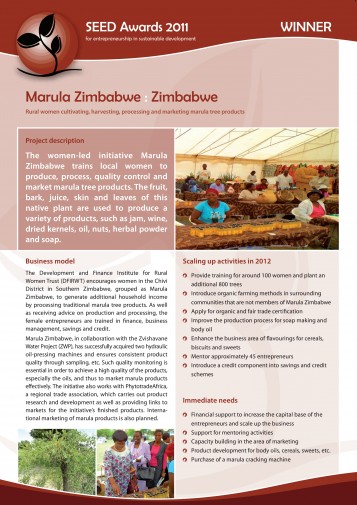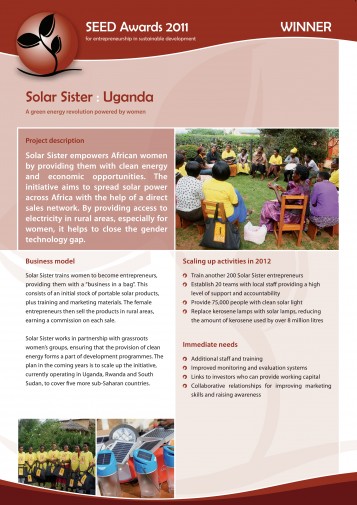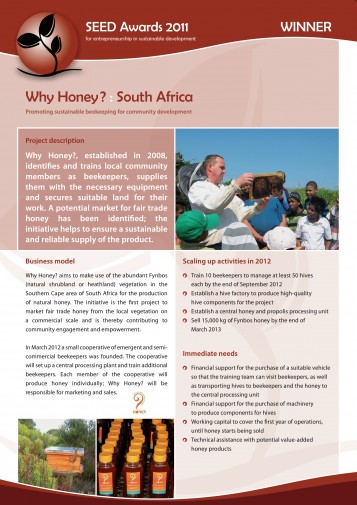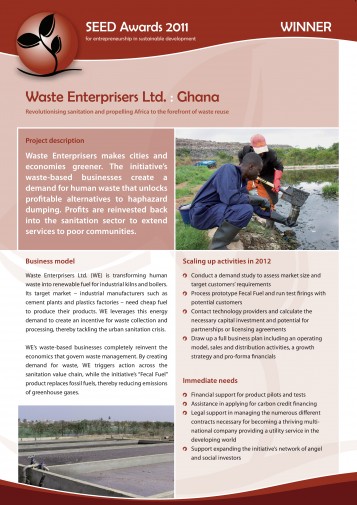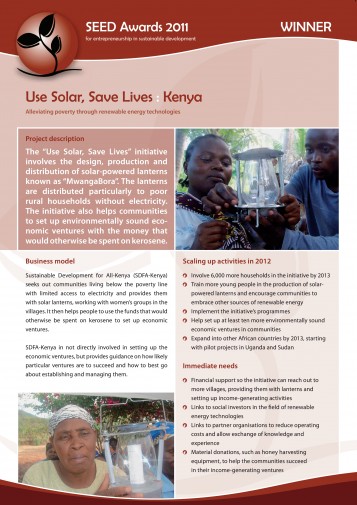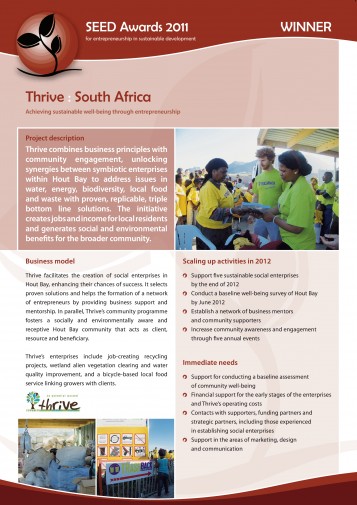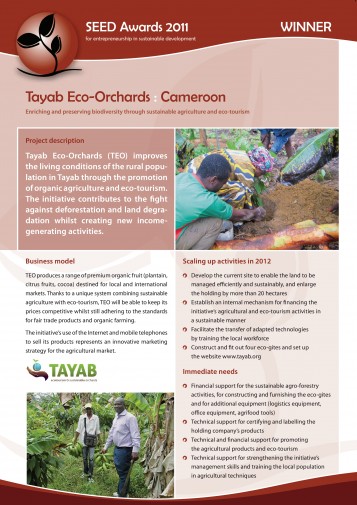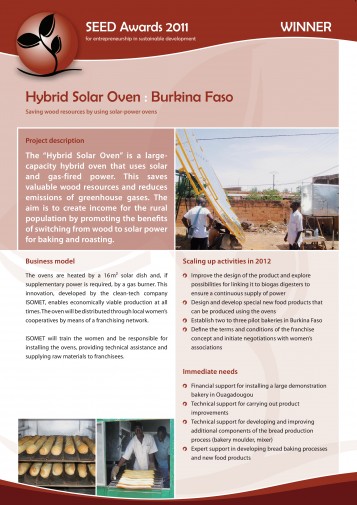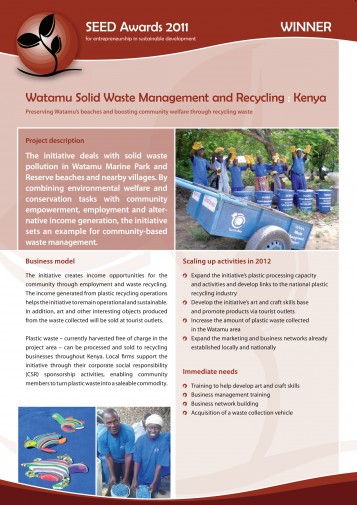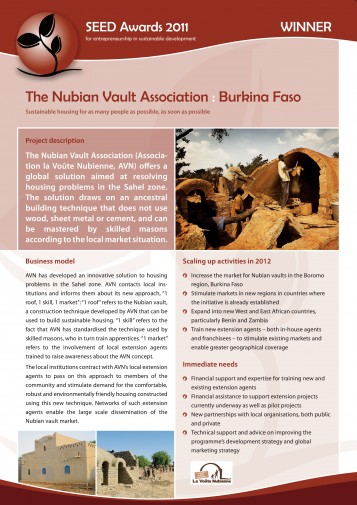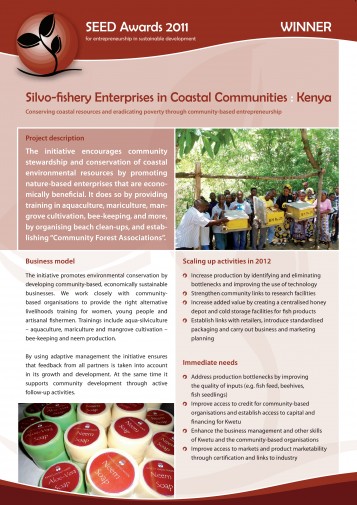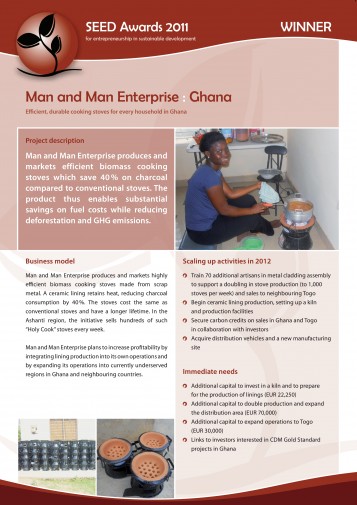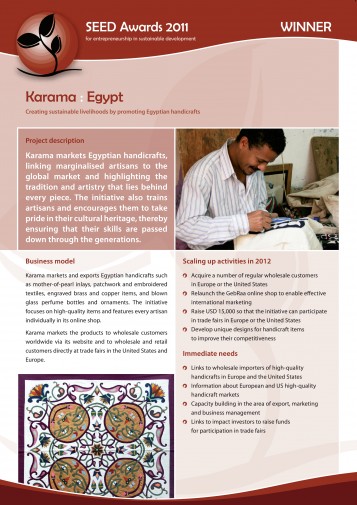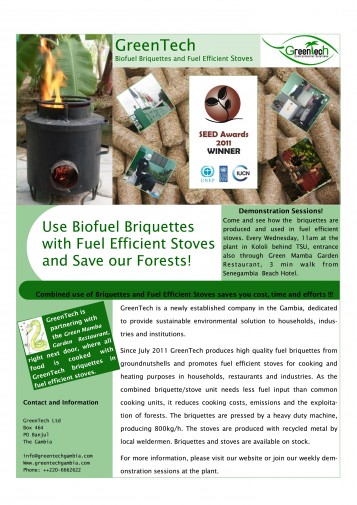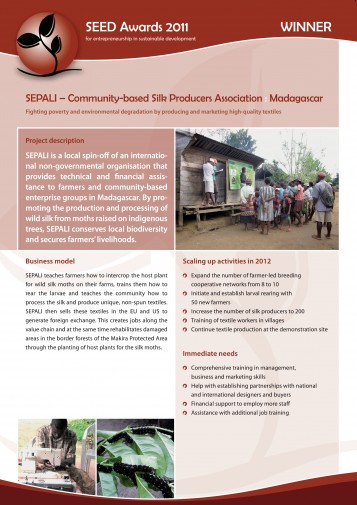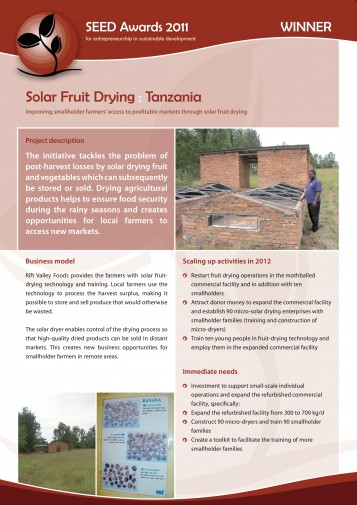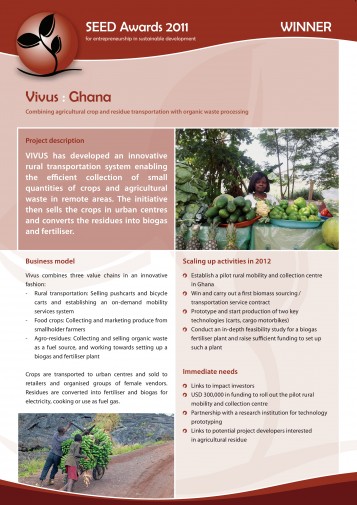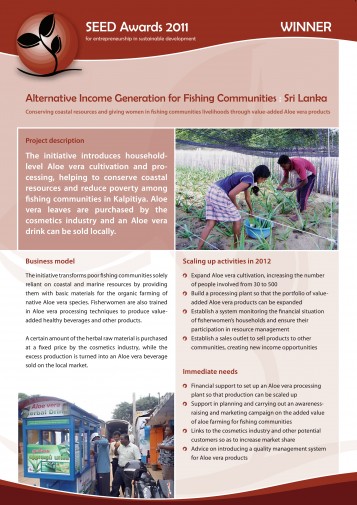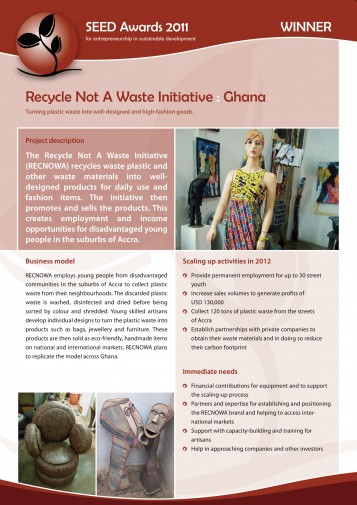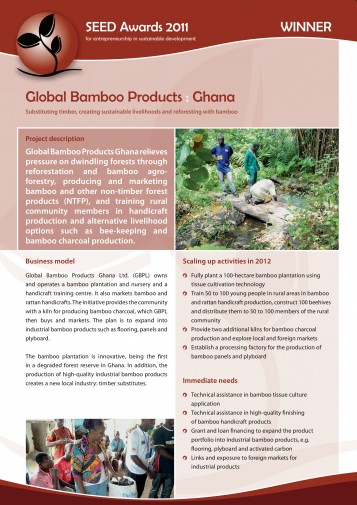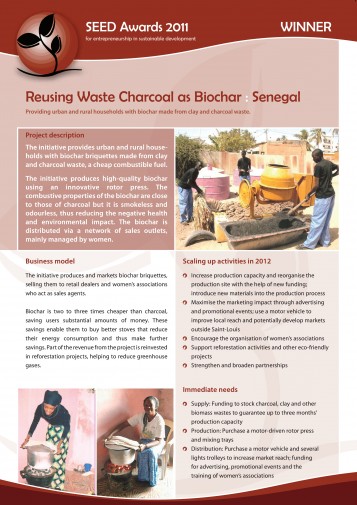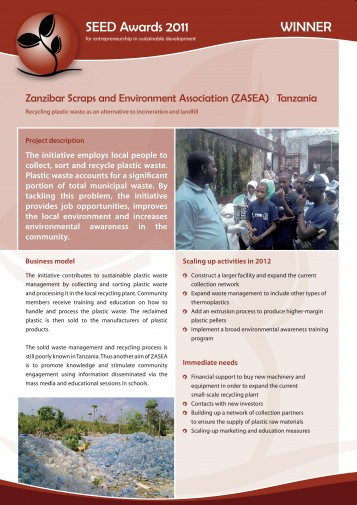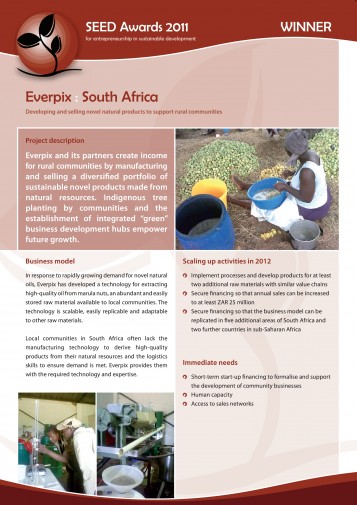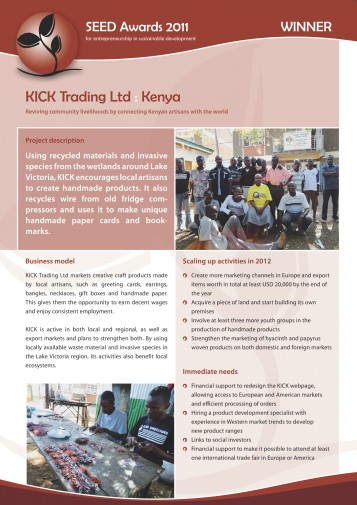Enterprise Brief: Marula Zimbabwe
Published: 30 August 2011
The women-led initiative Marula Zimbabwe trains local women to produce, process, control the quality of, and market marula tree products. The fruit, bark, juice, skin, and leaves of this native plant are used to produce a variety of products, such as jam, wine, dried kernels, oil, nuts, herbal powder, and soap. Read more
SDGs:









Enterprise Brief: Solar Sister
Published: 30 August 2011
Solar Sister empowers African women by providing them with clean energy and economic opportunities. The initiative aims to spread solar power across Africa with the help of a direct sales network. By providing access to electricity in rural areas, especially for women, it helps to close the gender technology gap. Read more
SDGs:











Enterprise Brief: Why Honey
Published: 30 August 2011
Why Honey?, established in 2008, identifies and trains local community members as beekeepers, supplies them with the necessary equipment and secures suitable land for their work. A potential market for fair trade honey has been identified; the initiative helps to ensure a sustainable and reliable supply of the product. Read more
SDGs:









Enterprise Brief: Waste Enterprisers
Published: 30 August 2011
Waste Enterprisers makes cities and economies greener. The initiative’s waste-based businesses create a demand for human waste that unlocks profitable alternatives to haphazard dumping. Profits are reinvested back into the sanitation sector to extend services to poor communities. Read more
SDGs:







Enterprise Brief: Sustainable Development For All
Published: 30 August 2011
The “Use Solar, Save Lives” initiative involves the design, production and distribution of solar-powered lanterns known as “MwangaBora”. The lanterns are distributed particularly to poor rural households without electricity. The initiative also helps communities to set up environmentally sound economic ventures with the money that would otherwise be spent on kerosene. Read more
SDGs:









Enterprise Brief: Thrive
Published: 30 August 2011
Thrive combines business principles with community engagement, unlocking synergies between symbiotic enterprises within Hout Bay to address issues in water, energy, biodiversity, local food, and waste with proven, replicable, triple bottom line solutions. The initiative creates jobs and income for local residents and generates social and environmental benefits for the broader community. Read more
SDGs:









Enterprise Brief: AGRIPO
Published: 30 August 2011
Tayab Eco-Orchards (TEO) improves the living conditions of the rural population in Tayab through the promotion of organic agriculture and eco-tourism. The initiative contributes to the fight against deforestation and land degradation whilst creating new income generating activities. Read more
SDGs:





Enterprise Brief: Women Environment Preservation Committee (WEPCO)
Published: 30 August 2011
The initiative seeks to enhance environmental conservation while generating income from recycled household waste, mainly in Kathmandu Valley. Women are provided with business and waste management training and access to micro-credit loans, and are encouraged to form conservation groups across the country. Read more
SDGs:







Enterprise Brief: ISOMET Sarl
Published: 30 August 2011
The “Hybrid Solar Oven” is a large capacity hybrid oven that uses solar and gas-fired power. This saves valuable wood resources and reduces emissions of greenhouse gases. The aim is to create income for the rural population by promoting the benefits of switching from wood to solar power for baking and roasting. Read more
SDGs:









Enterprise Brief: Watamu Community Solid Waste Management and Recycling Enterprises
Published: 30 August 2011
The initiative deals with solid waste pollution in Watamu Marine Park and Reserve beaches and nearby villages. By combining environmental welfare and conservation tasks with community empowerment, employment and alternative income generation, the initiative sets an example for community-based waste management. Read more
SDGs:









Enterprise Brief: Nubian Vault Association
Published: 30 August 2011
The Nubian Vault Association (Association la Voûte Nubienne, AVN) offers a global solution aimed at resolving housing problems in the Sahel zone. The solution draws on an ancestral building technique that does not use wood, sheet metal or cement, and can be mastered by skilled masons according to the local market situation. Read more
SDGs:







Enterprise Brief: Upscaling the siliviculture based enterprises of coastal communities in Kenya
Published: 30 August 2011
The initiative encourages community stewardship and conservation of coastal environmental resources by promoting nature-based enterprises that are economically beneficial. It does so by providing training in aquaculture, mariculture, mangrove cultivation, bee-keeping, and more, by organising beach clean-ups, and establishing “Community Forest Associations” Read more
SDGs:







Enterprise Brief: Man and Man Enterprise
Published: 29 August 2011
Man and Man Enterprise produces and markets efficient biomass cooking stoves which save 40 % on charcoal compared to conventional stoves. The product thus enables substantial savings on fuel costs while reducing deforestation and GHG emissions. Read more
SDGs:







Enterprise Brief: Karama
Published: 29 August 2011
Karama markets Egyptian handicrafts, linking marginalised artisans to the global market and highlighting the tradition and artistry that lies behind every piece. The initiative also trains artisans and encourages them to take pride in their cultural heritage, thereby ensuring that their skills are passed down through the generations. Read more
SDGs:









Enterprise Brief: GreenTech Company Ltd - fuel briquettes from groundnut shells combined with fuel efficient stoves
Published: 29 August 2011
Since July 2011, GreenTech produces high quality fuel briquettes from groundnutshells and promotes fuel efficient stoves for cooking and heating purposes in households, restaurants and industries. As the combined briquette/stove unit needs less fuel input than common cooking units, it reduces cooking costs, emissions and the exploitation of forests. The briquettes are pressed by a heavy duty machine, producing 800kg/h. The stoves are produced with recycled metal by local weldermen. Briquettes and stoves are available on stock. Read more
SDGs:







Enterprise Brief: SEPALI Madagascar
Published: 29 August 2011
SEPALI is a local spin-of of an international non-governmental organisation that provides technical and financial assistance to farmers and community-based enterprise groups in Madagascar. By promoting the production and processing of wild silk from moths raised on indigenous trees, SEPALI conserves local biodiversity and secures farmers’ livelihoods. Read more
SDGs:







Enterprise Brief: FADECO Trading Co. Ltd.
Published: 29 August 2011
The initiative tackles the problem of post-harvest losses by solar drying fruit and vegetables which can subsequently be stored or sold. Drying agricultural products helps to ensure food security during the rainy seasons and creates opportunities for local farmers to access new markets. Read more
SDGs:







Enterprise Brief: Rural Transportation and Renewable Products Conversion Centres for Agro-residues
Published: 29 August 2011
VIVUS has developed an innovative rural transportation system enabling the efficient collection of small quantities of crops and agricultural waste in remote areas. The initiative then sells the crops in urban centres and converts the residues into biogas and fertiliser. Read more
SDGs:







Enterprise Brief: Community-based, sustainable and commercially viable Aloe vera products as alternative income generation for fisherwomen in Bar Reef Special Management Area in Kalpitiya
Published: 29 August 2011
The initiative introduces householdlevel Aloe vera cultivation and processing, helping to conserve coastal resources and reduce poverty among fishing communities in Kalpitiya. Aloe vera leaves are purchased by the cosmetics industry and an Aloe vera drink can be sold locally. Read more
SDGs:









Enterprise Brief: Recycle Not A Waste Initiative – RECNOWA
Published: 29 August 2011
The Recycle Not A Waste Initiative (RECNOWA) recycles waste plastic and other waste materials into welldesigned products for daily use and fashion items. The initiative then promotes and sells the products. This creates employment and income opportunities for disadvantaged young people in the suburbs of Accra. Read more
SDGs:







Enterprise Brief: Global Bamboo Products
Published: 29 August 2011
Global Bamboo Products Ghana relieves pressure on dwindling forests through reforestation and bamboo agroforestry, producing and marketing bamboo and other non-timber forest products (NTFP), and training rural community members in handicraft production and alternative livelihood options such as bee-keeping and bamboo charcoal production. Read more
SDGs:









Enterprise Brief: BRADES
Published: 29 August 2011
The initiative provides urban and rural households with biochar briquettes made from clay and charcoal waste, a cheap combustible fuel. Read more
SDGs:





Enterprise Brief: Plastic Waste Recycling as an Alternative to Burning and Landfilling
Published: 29 August 2011
The initiative employs local people to collect, sort and recycle plastic waste. Plastic waste accounts for a significant portion of total municipal waste. By tackling this problem, the initiative provides job opportunities, improves the local environment and increases environmental awareness in the community. Read more
SDGs:







Enterprise Brief: Natural tree products and community resource management
Published: 29 August 2011
Everpix and its partners create income for rural communities by manufacturing and selling a diversified portfolio of sustainable novel products made from natural resources. Indigenous tree planting by communities and the establishment of integrated “green” business development hubs empower future growth. Read more
SDGs:







Enterprise Brief: GebRaa
Published: 29 August 2011
Using recycled materials and invasive species from the wetlands around Lake Victoria, KICK encourages local artisans to create handmade products. It also recycles wire from old fridge compressors and uses it to make unique handmade paper cards and bookmarks. Read more
SDGs:










